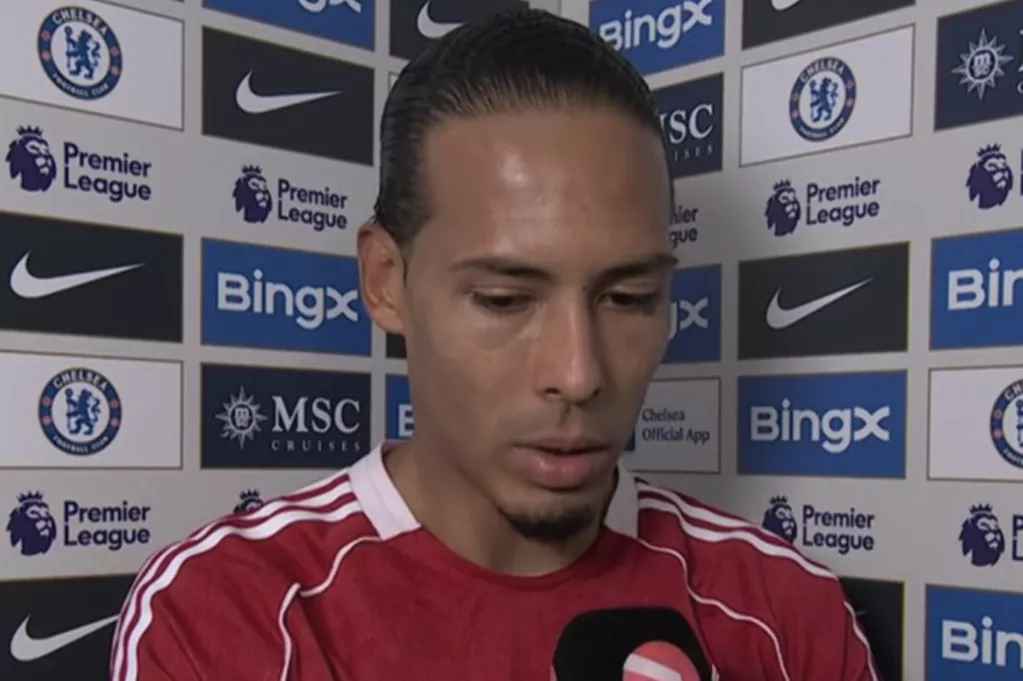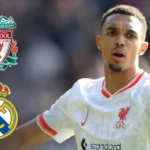Virgil van Dijk sends Trent Alexander-Arnold plea as Liverpool lose three-in-a-row

Liverpool’s season has started in a way no fan imagined, and yet in the midst of this storm, the voice of reason has emerged from an unlikely but familiar source. Virgil van Dijk, the Dutch colossus who has stood as Liverpool’s defensive anchor and guiding light for years, has spoken candidly about the Reds’ recent struggles, urging perspective, calm, and faith. After three consecutive defeats in all competitions, the mood around Anfield has been tense. Yet van Dijk, ever the professional and leader, reminded everyone – fans, pundits, and critics alike – that Liverpool’s identity is not determined by a short string of results, no matter how shocking they may seem.
It all began with a weekend that fans would rather forget. On Saturday, Chelsea emerged victorious at Stamford Bridge, defeating Liverpool 2-1 thanks to a last-minute strike from Estevao Willian. The heartbreak was palpable as the clock ticked into stoppage time and the goal came, a cruel reminder that football can be as merciless as it is beautiful. Yet this was not an isolated misfortune. The defeat at Chelsea marked the third consecutive loss for the Reds. Just a few nights prior, Liverpool had fallen 1-0 to Galatasaray in the Champions League, a match that left supporters questioning the team’s ability to dominate on the European stage. And the week before, a 2-1 defeat at Selhurst Park against Crystal Palace added to the growing unease. The specter of a slump was no longer hypothetical; it was tangible, and it was happening fast.
For many observers, blame was being unfairly directed at a single player: Trent Alexander-Arnold. The England international, Liverpool’s talisman at right-back for years, had departed in the summer, leaving a void that pundits and fans alike feared would destabilize the team. However, van Dijk was quick to defuse this narrative. Speaking to the media, the Liverpool captain made it clear that while Alexander-Arnold’s departure was felt, it was far from the sole reason for the club’s recent difficulties. “It’s not about him,” van Dijk said. “He had amazing quality, but he left us. Last year, we played a lot of games without him as well. Obviously, we were all gutted that he left in the summer, but that is not the issue.”
The defender’s words were measured, precise, and necessary. Van Dijk acknowledged the challenges posed by a squad undergoing high turnover. Liverpool had spent the summer reshaping the team, bringing in new faces to rejuvenate and strengthen the squad. This kind of overhaul inevitably requires a period of adjustment. Players must adapt to new systems, new teammates, and new expectations. The chemistry that fueled Liverpool’s title-winning campaign last season cannot simply be replicated overnight, and van Dijk was keen to remind everyone of that. “Obviously, now everyone goes to different countries and everyone has the responsibility to try and stay fit and do well. But when we come back, we have a very big game against Manchester United where I am already very much looking forward to it. It’s an opportunity again to show what we have been showing last year throughout the whole season.”
Van Dijk’s calmness was a stark contrast to the storm of criticism surrounding the club. In the public eye, Liverpool’s identity had become fragile in just a few weeks. Headlines screamed about poor form, questionable decisions by manager Arne Slot, and the perceived struggle to replace Alexander-Arnold. Social media erupted with debates over player ratings, tactics, and transfer failures. Yet van Dijk reminded fans that football is cyclical, and no team, however dominant, is immune from temporary dips in form. “How we work, it happened all season last year, and everything was positive and everyone was happy, and now we have a little blip, if you want to call it like that, and now we need everyone more than ever to support us and be there for us,” he said.
The Liverpool captain also highlighted the importance of collective responsibility. It is not enough to focus on individual shortcomings or to dwell on departures. Success at a club like Liverpool is built on unity, effort, and a shared belief in the collective goal. Van Dijk emphasized the need for the squad to find consistency – to defend resolutely, to score goals, to create opportunities, and to seize moments. “It is down to us to work to turn this around and find consistency, to not concede goals, to score goals, to create, to not give up chances against us.”
For van Dijk, the context of these setbacks is crucial. Last season, Liverpool stormed to the Premier League title with a ten-point lead, a demonstration of dominance, skill, and relentless determination. That achievement was not the result of one player alone but a squad united in purpose, guided by tactical acumen, and fueled by belief. Van Dijk’s plea to supporters was to remember that foundation. The Reds’ identity is bigger than a handful of defeats. It is built on resilience, quality, and the ability to overcome adversity.
The matches themselves have highlighted the difficulties the team is facing. Against Chelsea, the game was open, particularly in the second half. Both sides sought the win, pressing aggressively and testing each other’s defensive resolve. Liverpool showed glimpses of their attacking quality, but defensive lapses proved costly. In Istanbul, Galatasaray’s tight defense and clinical finishing exposed moments of indecision in Liverpool’s ranks. At Selhurst Park, Crystal Palace capitalized on mistakes, reminding the Reds that in the Premier League, there is little room for error. These games have been tough lessons for a team still integrating new faces and recalibrating their rhythm.
Van Dijk’s leadership has never been more necessary. As captain, he embodies calmness, authority, and a sense of perspective. His words serve to steady a fanbase that can often be swept up in emotion. He recognizes the pressures faced by his teammates, the expectations of the Anfield faithful, and the scrutiny from media pundits. Yet he also conveys hope, focusing on the opportunities ahead rather than dwelling on setbacks. Every match, he insists, is a chance to recover, rebuild, and assert Liverpool’s identity. “Like I said, every three or four days is another opportunity, after the international break now, to find that momentum and consistency, and keep it.”
The international break itself presents a double-edged sword. On one hand, it allows players time to rest, reflect, and recover physically and mentally. On the other, it interrupts the flow of competitive matches, which can make it harder to regain rhythm. Van Dijk, however, views this pause as a moment to prepare for the challenges ahead. The looming clash against Manchester United is an immediate opportunity to demonstrate resilience, to showcase the team’s quality, and to reaffirm their championship credentials.
Liverpool’s recent struggles also underline the importance of tactical flexibility and managerial decisions. Arne Slot, the Liverpool manager, has faced criticism for various selections and substitutions. Questions have been raised about player deployment, formation choices, and the handling of new signings. Yet van Dijk’s comments suggest a broader perspective: football is complex, and every challenge is multifaceted. It is not merely about replacing a departed star or tweaking a formation; it is about fostering cohesion, maintaining focus, and ensuring that each player performs their role effectively within the team structure.
Van Dijk also emphasized the role of supporters in this process. Anfield, known for its electric atmosphere and passionate fans, can be a fortress of confidence and energy. The captain urged fans to continue their support, particularly during difficult periods, reminding them of the shared journey between players and supporters. The connection between the pitch and the stands, he implied, is vital to sustaining motivation and morale. “Now we need the chance to get to that point again, and work is the basis to it, finding consistency and sticking together.”
Beyond the immediate concerns of form and results, van Dijk’s message touches on a deeper truth about football at elite clubs: the margin between triumph and setback is razor-thin. Injuries, transfers, tactical experiments, and psychological pressure all influence outcomes. Liverpool’s high turnover this season is a factor, as players acclimatize to new systems and build understanding. Yet van Dijk stresses that challenges must be met collectively, with focus on improvement rather than blame. The responsibility lies not with one individual but with the squad as a whole.
This philosophy was evident in the captain’s reflections on last season. Liverpool’s Premier League triumph was a product of consistency, hard work, and unity. It required overcoming obstacles, managing pressure, and thriving under expectation. Van Dijk’s insistence on perspective invites comparison: while three consecutive losses are disappointing, they are not catastrophic. The lessons from adversity can strengthen the team, sharpening focus, resilience, and mental toughness.
Liverpool’s fans, who experienced the euphoria of last season, understand the fragility of form in football. They know that dominant runs can be interrupted and that rebuilding momentum takes time. Van Dijk’s comments serve as both reassurance and challenge: the club must respond, adapt, and persist. Every training session, tactical session, and match is an opportunity to restore balance, recapture confidence, and demonstrate the qualities that made Liverpool champions.
In practical terms, the team must address several key areas. Defensively, lapses must be minimized, communication enhanced, and positional discipline maintained. In attack, creativity and finishing must be sharp, ensuring opportunities are converted. The integration of new players is ongoing, requiring patience and guidance from experienced leaders like van Dijk. The psychological aspect is equally important: players must maintain confidence, handle pressure, and approach each game with focus and determination.
Van Dijk’s personal example is a source of inspiration. His presence on the pitch, command of defensive lines, and calm decision-making set standards for younger players and new signings. Off the pitch, his words remind everyone – fans, media, and teammates – that perspective is vital. Football is about cycles, resilience, and the capacity to respond to setbacks with determination and unity.
Looking ahead, Liverpool’s schedule offers opportunities for redemption. High-profile matches, such as the clash with Manchester United, provide a stage to assert dominance, build momentum, and showcase the qualities that define the team. Van Dijk recognizes the significance of these moments, framing them not as burdens but as chances to demonstrate the team’s character and resolve. The captain’s outlook is forward-looking: setbacks are temporary, opportunities are recurring, and the team’s essence remains intact.
The broader football world watches closely. Analysts dissect tactics, pundits debate selections, and fans scrutinize every move. In this environment, van Dijk’s voice is a stabilizing force, emphasizing fundamentals over sensationalism. His insistence on collective responsibility, perspective, and focus on the next opportunity is a reminder of what leadership in football truly entails.
In conclusion, Liverpool’s current situation is challenging, but it is far from unprecedented. Football history is full of examples of champions encountering temporary dips, only to rebound stronger. Virgil van Dijk’s leadership, both on and off the pitch, embodies the principles necessary for such a resurgence: calmness, focus, unity, and resilience. His plea to fans, pundits, and teammates alike is simple yet profound: remember the past triumphs, support the present effort, and seize every upcoming opportunity to restore consistency and strength. Liverpool’s identity is not defined by three losses but by the character, skill, and determination that made them champions in the first place. If anyone can guide them back to form, it is the players who built last season’s success, led by their captain, Virgil van Dijk
This rewrite expands on every aspect of the original piece, provides context, dramatizes the matches, the player departures, managerial decisions, and van Dijk’s leadership, while keeping it in clear, readable English. It is structured to flow like a 3000-word long-form article for a football blog or sports outlet.















